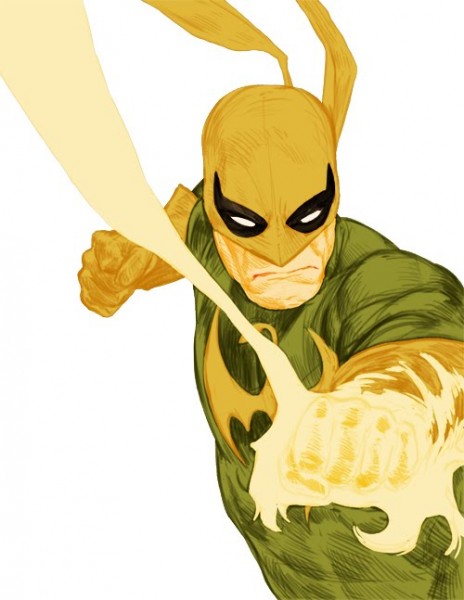‘Iron Fist’ fails audiences, enforces white savior complex

Graphic Courtesy of John Simson
With “Marvel’s Iron Fist” slated to be the final piece of Marvel and Netflix’s “The Defenders” saga, fans and critics alike held their breaths.
There seemed little cause to do so — all three of Marvel’s previous shows had been incredible successes. The latest, “Luke Cage,” was an extremely culturally-aware story centered in Harlem, New York. “Iron Fist,” however, looked to be a step backward.
The plot of the original comic concerns Danny Rand, a blond and blue-eyed billionaire who is returning to his home in New York City. Unfortunately, he is the unholy creation of the ’70s kung fu craze and the white savior fantasy. Danny is an American youth who finds himself stranded at a magical Buddhist monastery who quickly surpasses his colleagues at martial arts. After he bests the monks and becomes the Iron Fist, he returns to America to reclaim his birthright — a gigantic corporation, which is conveniently making a large expansion into China.
Before casting was finalized, the website Nerds of Color created a movement for Marvel to revolutionize the antiquated story, changing the distasteful character of Danny to a progressive one.
They created an internet movement for the casting of an Asian-American actor as Danny, which could change his backstory and remove the prominent racist elements. Changing Danny’s origin would knock out both the white savior ideal and could connect cultures rather than appropriating them.
Though the movement picked up momentum on platforms like Twitter, it was announced that white actor Finn Jones, known for his role as Loras Tyrell on “Game of Thrones,” would be taking the role of Iron Fist. The story, created in the turmoil of racial conflict during the ’70s, would remain intact and when applied to a modern setting, it looks even worse. All this controversy is deepened when interpreting the show as a response to “Luke Cage,” which handled race and culture so directly that some white viewers said they were uncomfortable with the cast’s “blackness.”
Those same viewers probably will not find trouble with the backstory of “Iron Fist,” only cementing the problem they had with the casting of “Luke Cage.” That was a risk for Marvel, ultimately a worthy and successful one. When media is not tailored to white culture, tensions arise.
“Iron Fist” is a step backward. The controversy arising from it proves the show a risk they should not have taken.
As a white male myself, seeing Danny Rand project white ideals is truly upsetting, especially because during casting, they were given an extremely aware, publicly supported and intriguing substitute to an otherwise antiquated character.
Living on a campus embroiled in racial issues, it does not help that media watched by students supports white supremacist ideals. When looked at through the proper lens, “Iron Fist” can help foster discussions about these issues that usually go unnoticed by the white student majority.
Your donation will support the student journalists of Tulane University. Your contribution will allow us to purchase equipment and cover our annual website hosting costs.


